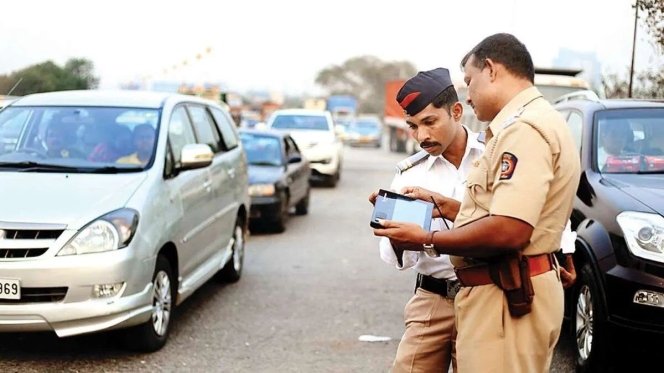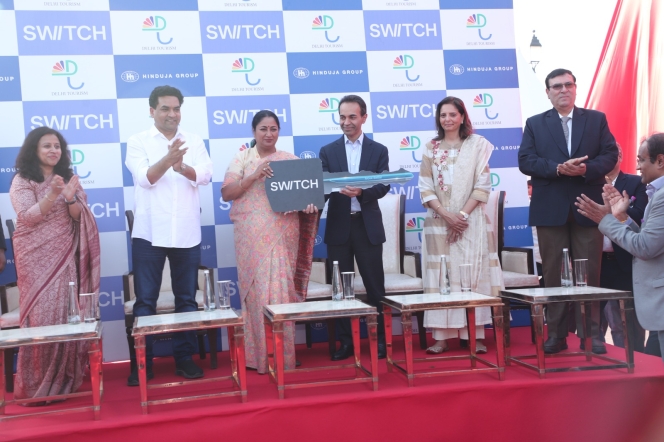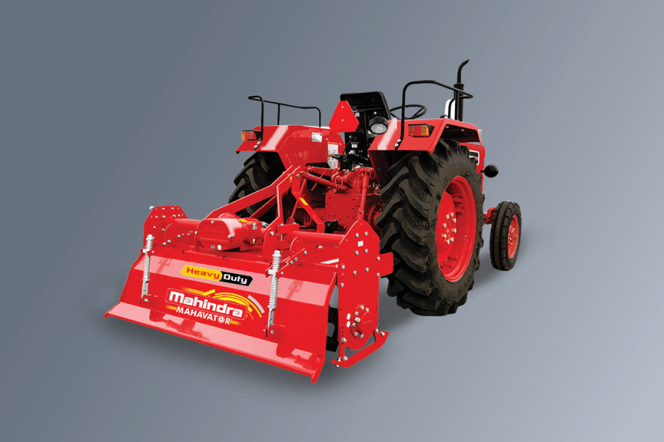E-Challans Find A Way to Annoy Transporters; To Agitate Them
- By Bhushan Mhapralkar
- December 18, 2024

Introduced by the Ministry of Road Transport and Highways (MoRTH), Government of India, in 2017 on a pilot basis by the Mumbai Traffic police in October 2016, the e-challan system has since been put into practive all over the country. Aimed at digitising the process of traffic violation enforcement by eliminating manual loopholes, the system is proving to be annoying for transporters however.
It is not the technology, but the ones who deploy the system, claims transporters. Stating that the e-challan system has over time become a source of significant distress for transporters even though its introduction was appreciated by the industry as it digitised the process of traffic violation enforcement and eliminated many manual loopholes, Bal Malkit Singh, Chairman - Core Committe and Former President, All India Motor Transport Congress (AIMTC), averred, "The system has over time become a source of significant distress for transporters and other road users. It has become a new ‘Frankenstein’ and death knell for the road transport sector.”
Stating that a strong resentment is brewing and the transport fraternity across the country is agitating, Singh said, “The intention behind e-challans is to improve transparency and reduce manual intervention, but several issues have risen to complicate the situation for transporters.” “The primary issue stems from the large volume of incorrect or excessive e-challans issued to them. Many trucks plying long distances are receiving multiple e-challans for the same alleged offense or due to erroneous readings from speed detection or overloading devices,” he added.
Giving an example of trucks travelling through multiple states often receiving fines for supposed infractions such as over-speeding or minor overloading even though they are within legal limits, Singh explained, “Such errors accumulate and led to a financial strain for transporters. This is exacerbated as transporters operate nationwide – covering diverse terrains and jurisdictions – that would mean that they may be penalised in various states.” “These fines often lack clarity or the chance for immediate redressal, leading to confusion and increased operational costs,” he elaborated.
Informing that enforcement officials have found a way around technology to generate motivated challans without any verifiable proof of offence, which is leading to acute harassment of the transport fraternity, Singh articulated, “There is neither authentication of any violation through static photo nor there is any transparency leading to acute harassment of the transport fraternity. Static photo of a parked vehicle is clicked and challans are issued for random offences. The vehicle owner may be from a geographically distant state and cannot contest the challan in court. Lack of communication regarding issuance of e-challan to the vehicle owner/operators who is sitting in one part of the country and must travel across the length and breadth of it to get it disposed/rectified.”
With instance where the vehicle owner comes to know of the challans issued only after he tries to dispose of his vehicle, goes to renew its fitness and to renew the permit (in the case of commercial vehicles), the issues with e-challans is pan-India in nature than be limited to a certain geographically or cultural area it looks like.
Transport associations like the All India Motor Transport Congress (AIMTC) have voiced concerns and are actively engaging with state and central authorities to address the growing problem. They have raised issues related to inaccurate e-challans due to technical errors or faulty detection equipment, lack of a unified system across states leading to inconsistency in how fines are issued and difficulty in contesting these fines as there is no streamlined process for redressal or appealing incorrect challans.
They are demanding a centralised and transparent grievance redressal system, standardisation of e-challan policies, equipment calibration across states and leniency or waiver of penalties that are clearly issued due to system malfunctions, according to Singh.
Of the opinion that traffic enforcement is a state subject, Singh expressed that the intensity and frequency of issues differ state-to-state therefore and in some states use of faulty equipment or overly strict enforcement practices that has led to a higher number of incorrect challans. Singh drew attention to issues like non-integration with national vehicle databases (such as Vahan 4) in some states. “The system in Telangana for example,” Singh articulated, “has been of specific concern for transporters because it is not fully integrated with the national system, leading to problems like wrongful issuance of challans for vehicles from other states.”
"The potential solutions to addressing the issue of e-challan," Singh commented, “Is to ensure scientifically verifiable evidence. A centralised grievance redressal system with a nodal officer should be put in place. The exact recording of the offence with exact measurement in case of over-height or overload or similar such case should be presented rather than a picture to avoid any doubt about motivated action. Equipment and procedures should be standardised. Vehicle databases should be integrated. Enforcement officials should ne trained to be humane. The accountability of the enforcement officials should be ascertained whenever the issue of motivated challans is there."
Image for representative purpose only.
Switch Mobility Deploys Electric Double-Decker Bus For Delhi Sightseeing
- By MT Bureau
- February 28, 2026

Switch Mobility, the electric vehicle arm of Ashok Leyland and part of the Hinduja Group, has announced the deployment of its Switch EiV 22 electric double-decker bus for the ‘Dekho Meri Dilli’ sightseeing route in the capital. The initiative is being implemented under the Hinduja Group’s Corporate Social Responsibility (CSR) programme.
The service provides residents and tourists with a zero-emission transport option to visit heritage landmarks. The full-day route begins at Dilli Haat – INA and includes stops at Vijay Chowk, Rashtrapati Bhavan, the National Museum, the National Gallery of Modern Art, the Pradhan Mantri Sangrahalya and the National War Memorial at India Gate.
The Switch EiV 22 is a standard-floor, air-conditioned electric double-decker designed and manufactured in India. The vehicle utilises a lightweight aluminium body and features a rear staircase and a wide rear door for passenger access.
Key technical features include:
- Battery: 231 kWh NMC (Nickel Manganese Cobalt) chemistry battery pack.
- Range: Up to 250 km on a single charge.
- Architecture: 650V system with a dual-gun charging setup.
- Capacity: Seating for 65 passengers.
- Cooling: Liquid-cooled battery technology for thermal management.
The bus components are manufactured domestically to comply with FAME II standards. Switch Mobility currently operates electric double-deckers in Mumbai, Ahmedabad, Bhubaneswar and Kerala, with a total of 100 electric tourist buses operational across 10 locations in India.
Mahindra Launches New Rotavator Series For Heavy-Duty Tillage
- By MT Bureau
- February 27, 2026

Mahindra & Mahindra, a manufacturer of tractors and farm machinery, has announced the launch of a new rotavator series. The range is positioned in the heavy-duty category under the Mahavator and Mahavator HD brands, covering widths from 4 to 9 feet.
The series features a wider mast design intended to improve stability and handling during tillage. According to the company, the structural changes were developed based on market analysis and feedback from farmers to address durability on uneven farm surfaces.
The new series replaces several existing models while sitting alongside Mahindra’s current portfolio. A key technical feature in the lineup is the ‘Tez-e’ Intelligent Rotavator, which utilises integrated Bluetooth technology. This system transmits real-time operational data from the farm to a mobile application to support precision farming.
The products are being manufactured at Mahindra’s dedicated units in Nabha, Punjab and Zaheerabad, Telangana.
The company has also introduced limited tricolour-inspired versions in Metallic Orange, Everest White and Metallic Green.
Dr. Anusha Kothandaraman, Vice President & Head – International Operations & Business Head – Farm Machinery, Mahindra Farm Equipment Business, said, “Farm mechanisation is crucial to farm productivity and rotavators play a crucial role in efficiently preparing farmlands. At Mahindra our newly designed rotavators are developed to further deliver superior performance, while also elevating a farmer’s sense of ownership of the farm equipment that support their livelihood beyond tractors. Offered initially in the 4 to 9 feet category, the new look rotavators will reach farmers through a phased rollout across Mahindra's extensive dealer network.”
- Tata Motors
- V.O. Chidambaranar Port Authority
- VOCPA
- Green Hydrogen Internal Combustion Engines
- Sarbananda Sonowal
- hydrogen
- Tata Prima 55-tonne
- Susanta Kumar Purhoit
- Rajesh Kaul
Tata Motors And VOC Port Authority Partner To Deploy 40 Hydrogen-Powered Trucks
- By MT Bureau
- February 26, 2026
Tata Motors has signed a Memorandum of Understanding (MoU) with the V.O. Chidambaranar Port Authority (VOCPA) to deploy 40 heavy-duty trucks powered by Green Hydrogen Internal Combustion Engines (H2 ICE). The agreement was signed in the presence of Sarbananda Sonowal, Union Minister of Ports, Shipping and Waterways.
The project involves a trial phase with a single hydrogen-powered prime mover, followed by the deployment of the remaining fleet over the next two years. Funding for the initiative is provided by the Ministry of Ports, Shipping and Waterways as part of a national strategy to decarbonise maritime logistics.
To support the fleet, VOCPA is developing a 2 MW electrolyser and a hydrogen refuelling station within the port. The trucks selected for this deployment are Tata Prima 55-tonne prime movers. These vehicles utilise H2 ICE technology, which adapts internal combustion principles to run on hydrogen instead of diesel, aiming for zero-tailpipe CO2 emissions.
The Prima trucks include driver-assist safety features and cabins designed to reduce fatigue during cargo handling operations. Tata Motors previously initiated hydrogen truck trials on freight corridors in 2025 and currently operates 15 hydrogen fuel cell buses in India.
Susanta Kumar Purohit, Chairperson, VOCPA, said, “Our partnership with Tata Motors marks a transformative step in VOC Port’s push to achieve net-zero emissions. The deployment of green hydrogen-powered trucks will significantly decarbonise our cargo handling operations while setting a benchmark for sustainable port-led logistics in India. To support the phased induction of these Green Hydrogen trucks, the port is also progressing plans to establish a 2 MW electrolyser and a dedicated hydrogen refueling station. This project along with various other initiatives related to green fuels reinforces our commitment towards building a robust green hydrogen ecosystem and positioning VOC Port as a leader in sustainable maritime infrastructure.”
Rajesh Kaul, Vice-President and Business Head – Trucks, Tata Motors, said, “Our collaboration with V.O. Chidambaranar Port Authority marks an important milestone in bringing hydrogen-powered heavy-duty trucking into real-world port operations. Over the past several months, we have worked closely with the port authorities to assess pathways for hydrogen trucks in cargo handling applications. This pilot will help demonstrate the potential of assessing the TCO parity and with Green Hydrogen in supporting the transition of India’s ports towards cleaner and more sustainable logistics solutions.”
SANY To Showcase Comprehensive North American Portfolio At CONEXPO 2026
- By MT Bureau
- February 25, 2026

SANY is set to make a significant impact at the CONEXPO-CON/AGG 2026 trade show, taking place at the Las Vegas Convention Center. The company will present its most comprehensive portfolio to date for the North American market, featuring an expansive display of machinery, digital technology and service capabilities. Operating under the theme ‘Together, We Move the Future Forward’, SANY will highlight the convergence of robust performance, intelligent innovation and lasting customer relationships as key drivers for the industry's evolution.
Visitors to Booth F44054 will encounter an impressive lineup of 32 machines and 17 attachments, with the spotlight on 10 newly introduced models engineered specifically for North American requirements. Among these, the SY10U Mini Excavator stands out for its zero tail swing design, providing exceptional manoeuvrability in confined spaces. Its operation is enhanced by a full hydraulic load sensing system, a suspension seat and wide armrests, ensuring a premium operator experience. The larger SY335LC Medium Excavator is powered by a substantial 9L Cummins engine generating 209 kilowatts. This powertrain delivers 204 kN of bucket force and 153 kN of arm force, resulting in digging performance that is both powerful and precise for its class.
In the lifting category, the SCA3300A Lattice Boom Crawler Crane incorporates a smart windshield that automatically adjusts its tint based on sunlight intensity. It also offers an optional auxiliary power unit designed to optimise energy savings and lower emissions. Similarly, the SCA1100TB Telescopic Crawler Crane features an optional APU to reduce fuel consumption and engine wear, while a 360-degree surround view monitoring system enhances safety during lifts. The new generation SW940L Wheel Loader integrates a Cummins B6.7 engine with ZF transmission and drive axles. Its advanced full electronic control system ensures compatibility with mainstream attachments and enables intelligent functions like automatic limit control, one-touch bucket shake, parallel lift, tyre pressure monitoring and smart attachment selection and positioning. The STH5519 Telehandler comes standard with reversing radar and load moment protection. An integrated multifunction joystick is designed to improve operational efficiency by 20 percent, while a stability coefficient exceeding 1.3 promotes safer lifting operations.
Beyond the equipment itself, SANY will demonstrate a suite of intelligent solutions aimed at minimising downtime and maximising productivity. These include the SANY AI Service Assistant, which provides intelligent diagnostics, interactive fault identification and quick parts identification for efficient maintenance. The SANY RootPilot system offers high precision 3D guidance for smarter and faster construction processes. In a compelling live demonstration, SANY will remotely control an excavator located in Huzhou, China, directly from its US showroom, a distance of over 6,500 miles, using AI-assisted technology with one-click digging and loading capabilities. These technological demonstrations will be complemented by a showcase of SANY's comprehensive service capabilities, all designed to ensure equipment operates smoothly and reliably.






Comments (0)
ADD COMMENT